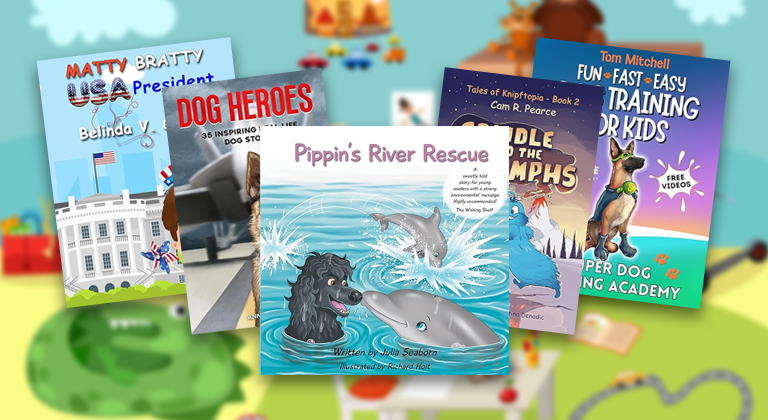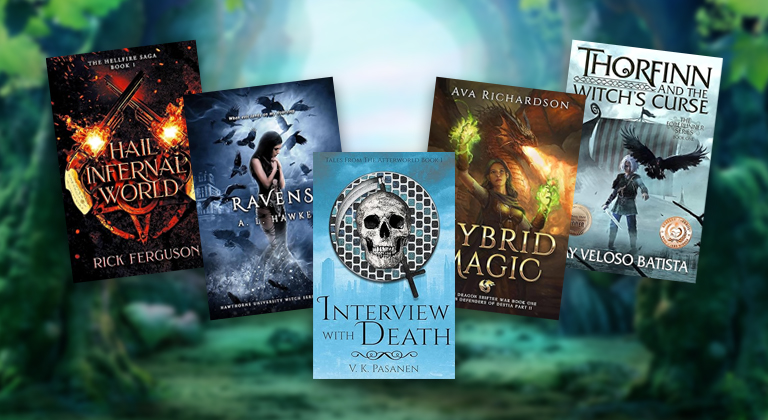Are AI-generated Books Already Ruining Kindle Unlimited?
With the rising number of low quality AI-generated books flooding the digital bookshelves, there is already cause for concern about how this affects authors and customers alike. This is especially true for those books that are part of the Kindle Unlimited program.
Many authors are suspicious of the sheer number of these titles, often with poor covers and questionable content, that have somehow made it onto the bestseller lists. It is believed that many of these books are being artificially pumped up via click farms that are downloading and “reading” the books, not only pushing out more legitimate books from the top charts, but also taking an unfair share of the KU money pool.
So what, if anything, is Amazon doing about it?
According to some sources, AI-generated books are flooding Amazon’s best-seller lists and causing concerns for both authors and readers enrolled in Kindle Unlimited.
When it comes to self-publishing your books on Amazon’s Kindle platform, there are generally only two ways to make significant amounts of money – either through direct book sales, or through Kindle Unlimited Page Reads.
For years, many have argued that you should “go wide for the win” and try to focus on book sales – leveraging not just Amazon, but also other online publishers like Barnes & Noble, Smashwords, and Apple Books. You can even listen to an entire episode of our Fully Booked podcast dedicated to this topic!
However, because Google and Apple have made it impossible for Amazon to sell books directly on their Kindle app, the counter-argument about focusing on Kindle Unlimited subscribers has gained a lot of traction lately. With KU, authors get paid for every page a Kindle Unlimited subscriber reads of their books – which can add up to a significant amount over time.
Crucially, Kindle Unlimited subscribers can still “buy” books on the Android or Apple versions of the Amazon or Kindle App, which means it’s a much more effective way of acquiring new readers if they’re tuning in via their mobile device. For authors using Facebook ads, targeting Kindle Unlimited subscribers rather than book buyers can often be the difference between an advertising campaign making a profit and suffering a loss.
But just as we’ve seen several times during the history of Kindle Unlimited, it looks like unscrupulous people have also noticed this trend and are trying to exploit it – and this time, they’re leveraging the power of Artificial Intelligence to do so.
The Rise of the AI-Generated Book
At the end of June, Australian indie author Catherine Bilson made a worrying observation. When reviewing Amazon’s bestseller lists in the Teen & Young Adult categories, she noticed that they were flooded with books that had very obviously been generated using AI – with generic covers created using Kindle’s cover creator, and plots and prose that were barely intelligible. Just 19 of the Top 100 books appeared to be written and published by an actual human being.
What made this especially concerning was the fact that these AI-generated books were clearly generating a ton of clicks and page reads – enough to get them in the top spots on some of the most hotly-contested bestseller lists, and earn whoever published them tens of thousands of dollars via Kindle Unlimited page reads.
This was a slap in the face for genuine authors for two reasons. Not only were these AI-generated books crowding out real books by real authors – but the fact that they were doing so through Kindle Unlimited page reads meant that they were also stealing the lion’s share of the monthly Kindle Unlimited page read fund – essentially stealing money that should have been shared among other, more deserving authors!
Catherine and other authors were horrified by this discovery – and by the fact that Amazon had allowed it to happen in the first place! Considering so many authors have recently been complaining about Amazon banning their books because pirated versions existed, it seems mind-boggling that Jeff Bezos’ behemoth would dedicate so much time to punishing legitimate authors while ignoring this kind of massive abuse happening right on their own platform.
But what is causing this problem? And what is the solution?
Click-farms and AI-Content
We’ve written about the dilemma posed by AI-written books before, but in this instance the fault can’t be laid exclusively at the doorstep of AI platforms like ChatGPT. It’s actually a combination of sketchy tactics that allowed unscrupulous people to exploit Kindle Unlimited this way – pairing effortlessly-generated junk content with massive click farms that artificially “read” these books and rack up those absurd (yet valuable) KU page reads.
“Click farming” involves bots automatically clicking through books on Kindle Unlimited, generating royalties for the publishers (I won’t call them authors) based on the number of pages read. Within a very short space of time, these click farms can artificially “read” dozens or hundreds of these AI-generated books and Amazon isn’t immediately aware that fraud is being committed. It’s a problem that’s existed for a while, but the impact of click farming is now being amplified because of the ease in which AI-generated “junk” books can be published.
Yes, Amazon finds out about these things eventually – sometimes only thanks to authors like Catherine Bilson making them aware of the problem – but even though Amazon removed these AI books from the bestseller lists after the issue was raised, the books are still available for purchase on the platform, and even more AI-generated books are rapidly appearing to replace them.
So, what can authors do to protect themselves from this abuse? And what steps can Amazon take to eliminate the problem?
It’s time for Amazon to get serious about AI-generated content
As of writing this, Amazon’s Kindle Direct Publishing platform still doesn’t require publishers to disclose whether the content of their eBook was created using Artificial Intelligence, and that’s one major part of the problem.
An argument could be made that it’s not fair to ban AI-generated content entirely from the platform, but something does need to be done to ensure unscrupulous people aren’t abusing the system – and ironically, Amazon might have such systems in place already.
I linked to a news story from February up above, in which authors were complaining that Amazon was removing their books from the Kindle Unlimited platform because pirated versions existed for “free” on the Internet. Amazon discovered this by searching the Internet for copy and content that authors had published on Kindle Unlimited; so, clearly they have powerful tools for scanning and searching the deepest nooks and crannies of the Internet.
If Amazon used these same tools to seek out AI-generated content on their own platform, perhaps that would help them turn the tide of spammy AI-generated books.
If so, Amazon also needs to be as draconian with the publishers of abusive AI-generated content as they are with regular, human authors. Part of the problem is that the AI-generated books which hit the bestseller lists remain available for sale even after Amazon identified and rectified the problem. Shouldn’t abusive publishers face the same penalties as human authors, such as losing their publishing accounts entirely? I’d argue this is a second vital step in the process – cutting the legs out from abusive publishers before they can repeat their crime.
Conclusion
While we can discuss what is and isn’t the best approach for dealing with this problem, one thing is becoming increasingly clear: Amazon’s handling of this issue is being closely observed by authors and readers who rely on the company taking rapid and necessary steps to protect human-created works and maintain the trust of its audience; and we can only pray that Amazon is up to that challenge.
It’s problems like this that can make or break a self-service publishing platform, so the problem needs to be addressed sooner rather than later.
What do you think the solution might be? And how do you feel about whether or not Amazon should allow AI-generated books to be published in the first place? We’d love to know your opinion, so don’t be shy about sharing it in the comment section below.
In the meantime, be on the lookout for more stories like this. I fear this is just the tip of the iceberg – and that the arrival of AI might create a lot more problems before platforms like Amazon come up with definitive and effective solutions.












Thanks, Ginger, now I can sleep better. Amazon do the right thing? I wouldn’t be surprised if Bezos’ solution to policing AI-generated material is to stop offering books on the site.
I don’t think there is any escape from AI. It is here to stay. However, there needs to be something in place to protect authors. That we are in this situation now is our fault. We have allowed Amazon to become more powerful than the gatekeepers most of us complained about. At the end of the day Amazon doesn’t care about us, they care about the consumer and until they complain about the content, it’s doubtful anything will be done about the situation. I’m a hybrid author and have started selling off my website. My goal is to sell there, even though it may take years to build.
As both a KDP-published author and a short story writer who often submits short stories to magazines for publication, I am particularly feeling the poison that AI is injecting into the publishing field. I hope large organizations like Amazon and the magazine publishers will double their efforts to stop the inate abuses of the AI world. AI’s influence is ruining the legitimate writing world and making it even more difficult for real writers like myself by taking away the meager amount we earn from a hobby where it is nearly impossible to gain any monetary reward for our efforts.
I think it was about three years ago that Amazon got draconian with click farms. They banned the accounts used by the click farms and the books they were targeting. Then the click farms dreamed up a new way to protect themselves from banning; they started throwing some top 100 books into their rotation to look more like legit readers. The result? Many of the top 100 authors suddenly lost their accounts and careers forever.
Amazon has demonstrated that they have the ability to identify the click farms, but their use of automation to handle every aspect of the process is scary. I just went through a process where I was automatically identified as abusing the return and refund policy. I could not find a single return or refund to my account in over five years. However, the bots that run the process kept insisting I had. It was not until I emailed Jeff Bezos directly that I got some traction on resolution.
I don’t trust Amazon to execute this correctly; it will become a nightmare before it gets better.
This is sobering, but I can’t say I’m surprised. As an author, I pride myself on the originality and quality of my work. Unfortunately, the deluge of AI-produced content will degrade the already-low reputation self-published authors already have.